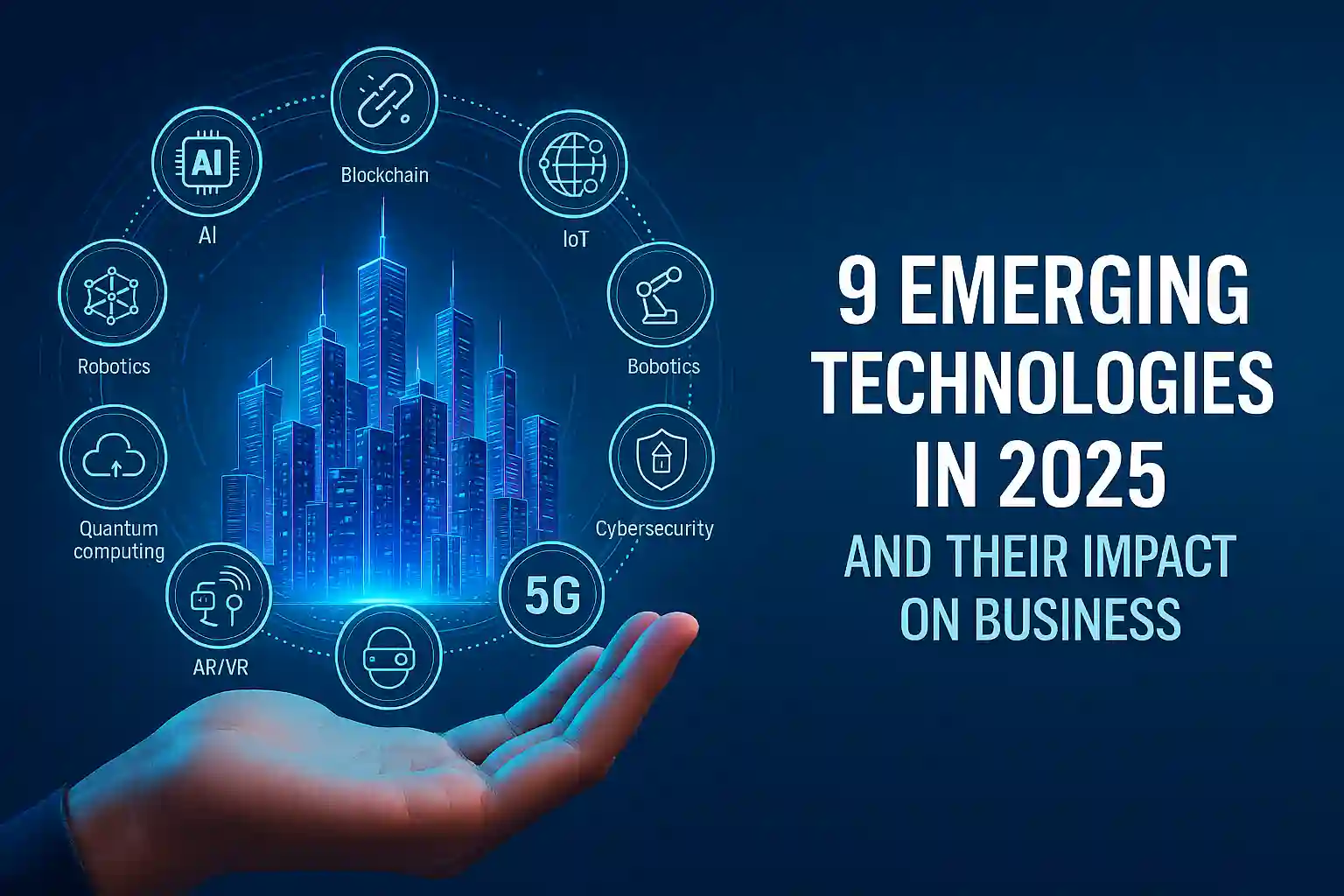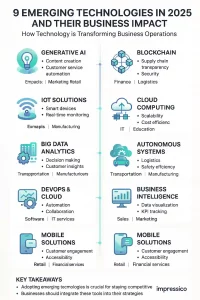9 Emerging Technologies in 2025 and Their Impact on Business

The landscape of future technology trends is evolving at an unprecedented pace. For business leaders, understanding the impact of emerging technologies on business is no longer optional—it’s a strategic imperative. This exploration into the key emerging technologies of 2025 will demonstrate how innovations like AI, Blockchain, and IoT are revolutionizing industry verticals, creating new opportunities for efficiency, growth, and competitive advantage. Let’s delve into how these technologies are shaping the modern enterprise.
According to Gartner, over 80% of enterprises will have used GenAI APIs or deployed GenAI-enabled applications by 2026
Emerging Technologies and their Impact on Industry Verticals
As we look at the future technology trends defining the business landscape, understanding the impact of emerging technologies on business is crucial for maintaining a competitive advantage through technology. This analysis provides a essential list of emerging technologies for 2025, exploring specific applications like generative AI business applications and blockchain in supply chain management to show exactly how technology is changing business across various sectors.
When we talk about artificial intelligence, machine learning, autonomous systems, blockchain, and virtual/augmented reality, these new technologies aren’t just concepts – companies across every sector are actively exploring practical applications and investing considerable resources into research and development. In this post, we will discuss how emerging technologies impact the industry verticals.
How Key Technology Trends are Driving Digital Transformation
1. Big Data & Analytics: Unleashing Data-Driven Decision Making
-
- Big Data’s Untapped Potential: Although the potential of big data is widely acknowledged, its application often remains confined to marketing activities. However, its impact extends far beyond crafting targeted advertising strategies. For instance, a study analyzing over 900,000 food reviews revealed that sandwiches with bacon received higher ratings. This kind of insight allows businesses to optimize their offerings based on consumer preferences, maximizing profitability.
- Birth of Industries: The big data revolution has given rise to entire industries, with companies like MapMyGenome, 23andMe, and Ancestry utilizing extensive data analysis to provide customers with in-depth insights into their health or heritage. This exemplifies how businesses can leverage big data not only for operational improvements but also for pioneering entirely new ventures.
2. Cloud Computing: The Foundation for Scalability and Innovation
-
- Cloud Computing’s Broad Horizons: Cloud computing, often associated merely with storage, offers immense potential when harnessed correctly. Beyond data storage, the cloud can perform a myriad of compute-heavy tasks. In a groundbreaking feat, Google Cloud’s infrastructure was used to calculate the value of Pi to 31.4 trillion decimal places, showcasing the vast computational power of the cloud.
- Diverse Applications: Cloud computing is deployed across industries to develop prototypes in life sciences, enhance efficiency ratios in financial services, provide cross-platform gaming solutions, and securely store national security information. The examples underscore the diverse applications of cloud computing, far beyond conventional perceptions.
3. Artificial Intelligence & Machine Learning: Revolutionizing Customer and Operational Excellence
-
- Conversational Commerce: Artificial intelligence (AI), when combined with big data, becomes a powerful tool for organizations. Insights derived from AI-powered analytics contribute to scaling new heights. An unexpected application of AI is witnessed in customer care through conversational commerce, driven by voice and chat-based assistants. The ubiquity of smart speakers further propels the growth of AI in this sphere.
- Healthcare Revolution: AI’s groundbreaking applications extend to healthcare, going beyond traditional medical equipment. AI and machine learning are now employed to administer preventative healthcare, revolutionizing how individuals and societies approach well-being.
Transformative Technologies Reshaping Physical Operations
4. Autonomous Systems: Enhancing Safety and Efficiency in Logistics and Beyond
-
- Beyond Delivery Services: While self-driving vehicles are commonly associated with unmanned delivery, their applications are far more expansive. In mineral exploration, autonomous vehicles are revolutionizing material hauling at mines and ports, ensuring safety and efficiency.
- Rise of Drones: Autonomous drones find applications in diverse sectors, particularly in media, where they enable smaller outlets to capture high-quality aerial shots. In environmental monitoring, conservation, and disaster relief, drones have become invaluable tools, showcasing their versatility beyond conventional uses.
5. Blockchain: Building Trust and Transparency Beyond Cryptocurrencies
A prime example of practical innovation is the use of blockchain in supply chain management, which moves far beyond its financial origins.
-
- Supply Chain Revolution: Often synonymous with cryptocurrencies, blockchain’s applications extend into supply chain management. Businesses leverage blockchain to simplify and track complex and geographically widespread supply chains. The technology digitizes components, enabling real-time tracking and operational optimization.
- Ensuring Food Safety: Blockchain ensures freshness, safety, and sustainability in the food supply chain by connecting farmers, distributors, and retailers. It supports ethical sourcing, exemplified by its use in ‘net-to-plate’ fishing, providing transparency about when and where a fish was caught.
6. Internet of Things (IoT): Connecting the Physical and Digital Worlds
IoT technology enables businesses to monitor assets in real-time, with sensors providing valuable data for predictive maintenance and operational efficiency. Manufacturing plants use IoT to reduce downtime by 30-50% through equipment monitoring.
Impact: Real-time monitoring, predictive maintenance, operational efficiency
Business Applications:
- Smart factories with connected equipment
- Supply chain tracking with sensors
- Energy management in buildings
- Remote asset monitoring
7. 5G Networks: The Backbone of Real-Time Business Operations
With speeds up to 100x faster than 4G, 5G enables applications like remote surgery, autonomous vehicle coordination, and seamless augmented reality experiences that were previously impossible.
Impact: Ultra-fast data transfer, enabling real-time applications
Business Applications:
- Remote surgery and telemedicine
- Autonomous vehicle communication
- Augmented reality retail experiences
- Smart city infrastructure
8. Quantum Computing: Solving Business’ Most Complex Problems
While still emerging, quantum computing shows promise for revolutionizing drug discovery, financial modeling, and logistics optimization by processing calculations that would take traditional computers centuries.
Impact: Solving complex problems impossible for classical computers
Business Applications:
- Drug discovery and molecular modeling
- Financial risk analysis and optimization
- Cryptography and cybersecurity
- Supply chain optimization
9. Augmented and Virtual Reality: Transforming Customer and Employee Experiences
AR/VR technologies are changing how businesses train employees, demonstrate products, and collaborate remotely, with the market expected to reach $300+ billion by 2024.
Business Applications:
- Virtual product demonstrations
- Employee training simulations
- Remote collaboration tools
- Retail try-before-you-buy experiences
Additional Pillars of Modern Technology Solutions
Beyond the core emerging technologies, a strong digital foundation is built on proven methodologies and development practices. Here’s a look at other critical services that empower businesses:
- DevOps & Cloud
DevOps, a portmanteau of Development and Operations, represents a set of practices aimed at fostering collaboration between software development and IT operations. The DevOps services and solutions emphasizes automation, continuous integration, and continuous delivery to enhance efficiency throughout the software development lifecycle. Impressico provides the best DevOps services and solutions! - Offshore Software Development
Offshore software development involves outsourcing software development tasks to a company located in a different geographic location. The Offshore software development company approach offers cost-effectiveness, access to a global talent pool, and flexibility in project scaling. Impressico is the best offshore software development company. - Agile Development
Agile is an iterative and flexible software development approach that prioritizes collaboration, customer feedback, and small, incremental releases. It promotes adaptability to changing requirements throughout the development process. Impressico offers agile software development solutions for businesses. - Business Intelligence (BI)
Business Intelligence involves the use of technology to collect, analyze, and present business data to support decision-making processes. BI services companies specialize in offering solutions to harness the power of data for strategic insights. - Frontend Development
Frontend development focuses on creating the user interface and user experience of a website or application. It involves implementing designs and ensuring a seamless interaction between users and the application. - Custom Mobile App Development
Custom mobile app development involves creating tailored applications to meet specific business requirements. It caters to unique functionalities and user experiences, ensuring a competitive edge in the market. - IoT Solutions
Internet of Things (IoT) solutions involve connecting physical devices to the internet, enabling data exchange and automation. IoT services cater to the development and implementation of interconnected devices.
- Generative AI
Generative Artificial Intelligence involves creating models capable of generating new and original content, such as images, text, or even music. These models learn patterns and create diverse outputs. - Microsoft Azure
Microsoft Azure is a cloud computing platform that provides a wide range of services, including computing power, storage, and databases. It supports the deployment and management of applications and services.
Harnessing Emerging Technologies 2025 for Growth
The list of emerging technologies we’ve explored—from AI to IoT—highlights the profound impact of emerging technologies on business. The key takeaway is that leveraging these tools is the definitive path to gaining a competitive advantage through technology. This evolution in how technology is changing business requires a partner who can guide the integration of specific solutions, from generative AI business applications to implementing blockchain in supply chain management.
Preparing Your Business for the Future of Technology
It is clear that emerging technologies are shaping the future of every industry vertical. From healthcare to finance, from retail to transportation, technology is revolutionizing the way we live and work. It is essential for businesses to stay ahead of the curve and embrace these developments in order to remain competitive in today’s fast-paced world.
Whether it’s through implementing DevOps Cloud or utilizing generative AI services, there are countless opportunities for companies to leverage emerging technologies and enhance their operations.
As we continue to witness advancements in technology, we must remember the importance of keeping human compassion at the forefront.
At Impressico, we understand that leveraging these key technology trends is essential for digital transformation. We are dedicated to providing top-notch services—from DevOps and Cloud optimization to advanced Generative AI services—to empower your business with innovative, practical solutions.
Let us help you harness the power of technology and create a brighter future for your industry vertical. Contact us today and let’s embark on this journey together towards a more efficient and connected world.
Key Highlights
-
- Beyond marketing insights, big data is leveraged to optimize offerings based on consumer preferences.
- Cloud computing extends far beyond storage, showcasing computational prowess in record-breaking feats.
- Artificial Intelligence (AI) collaborates with big data in customer care through conversational commerce.
- Autonomous vehicles redefine industries, not just in delivery services but also in mineral exploration and media capture.
- Blockchain’s applications go beyond cryptocurrencies, transforming supply chain management and ensuring transparency in the food supply chain.
FAQs: Emerging Technologies 2025 and Business Impact
-
What are the most important emerging technologies in 2025 for businesses?
The key emerging technologies for 2025 include Generative AI, Blockchain, IoT solutions, and advanced Cloud computing platforms. These technologies are transforming business operations by enabling automation, enhancing data security, and creating new opportunities for innovation across various industry verticals.
-
How can businesses gain competitive advantage through emerging technologies?
Companies can achieve competitive advantage by leveraging technologies like AI for personalized customer experiences, blockchain for transparent supply chain management, and data analytics for informed decision-making. Early adoption and strategic implementation allow businesses to optimize operations and differentiate themselves in the market.
-
What are some practical generative AI business applications?
Practical generative AI applications include automated content creation, customer service chatbots, product design optimization, and predictive analytics. These applications help businesses scale operations, reduce costs, and enhance creativity while maintaining quality standards.
-
How is blockchain being used in supply chain management beyond cryptocurrencies?
Blockchain technology ensures transparency and efficiency in supply chain management by providing real-time tracking of goods, verifying authenticity, reducing fraud, and streamlining logistics. This application is particularly valuable for industries requiring meticulous documentation like food safety, pharmaceuticals, and luxury goods.
-
What is the projected impact of emerging technologies on business operations by 2025?
By 2025, emerging technologies are expected to revolutionize business operations through increased automation, data-driven decision making, and enhanced customer experiences. Companies that effectively integrate these technologies will see improved efficiency, reduced costs, and stronger competitive positioning.
Ready to harness the power of these emerging technologies?
Let us help you build a tailored strategy to enhance your operations and secure a competitive advantage. Contact Impressico today to embark on your journey toward a more efficient and connected future.

